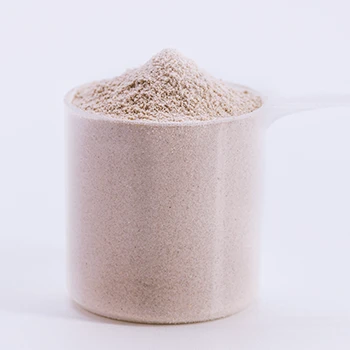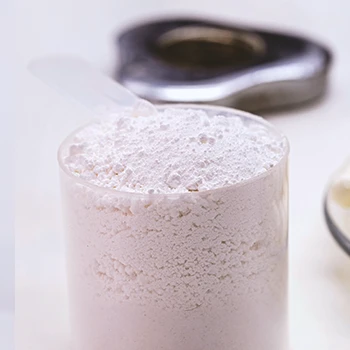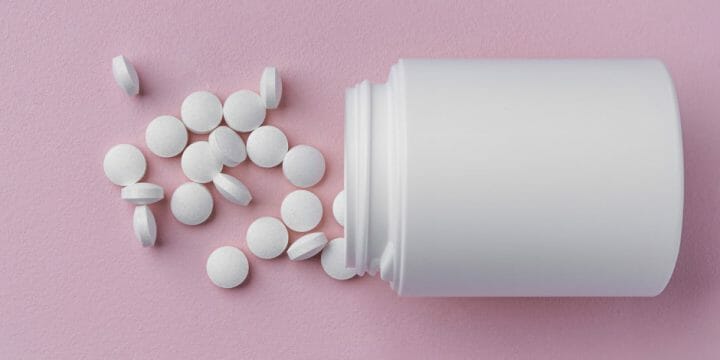As a personal trainer who is always eager to recommend new protein powders to my clients, I always get asked the same question: should they choose casein over whey and vice versa?
To get to the bottom of this, I've teamed up with my dietician to research trials and see if one is really superior to the other.
Here's what I found.
Quick Summary
- Casein protein undergoes different processing stages, whereas whey protein is removed from coagulated milk fats.
- Whey protein, a "fast-acting" protein, contains all nine essential amino acids crucial for muscle growth and preservation, unlike casein.
- In a 12-week National Institutes of Health (NIH) study, participants using protein concentrate lost three times more body fat compared to those on a placebo.
- From my experience, many users report feeling fuller for longer after consuming casein, which is attributed to its higher satiety level compared to whey protein.
Differences Between Whey and Casein Proteins
Whey and casein protein powders are primarily made from animal products, like cow and goat milk.
Milk has two primary forms of protein [1].
- Casein (80%)
- Whey (20%)
Whey Protein

Whey protein concentrate is removed from the coagulated milk fats as a byproduct of the cheese-making process [2].
Whey is separated during cheese making and processed through several procedures to produce what is known as whey protein supplementation.
The separation procedure produces whey, which contains the highest fat and carbohydrates. You can further process it to create the nearly fat- and carbohydrate-free whey isolate, or you can use hydrolyzed whey [3].
Hydrolyzed whey has already undergone some hydrolysis and is therefore digested a little more quickly [4].
From my experience, whey protein offers a convenient way to boost protein intake. I've found its versatility in forms like shakes (chocolate, vanilla, and strawberry flavors), meal supplements, and bars incredibly useful in my daily routine.
I take my whey protein powder either as:
- A protein shake
- A meal supplement
- A protein bar
Casein Protein

In my fitness journey, I've noticed that casein, due to its unique processing, digests slower than whey.
This slower digestion rate makes it an excellent choice for a nighttime protein source, helping me stay full through the night.
A curdling agent - often acid or heat - is added to separate the solids and liquids in milk. As a result, the curds cluster together and float on top of the watery whey [5].
These solids are then skimmed off to one of two destinations. They either create cheese or casein for people in the fitness world [6].
The solids are finally desiccated and powdered before they can be used as sports nutrition supplements.
"Whey and casein dietary protein contain all the essential amino acids which are like the building blocks needed to support the maintenance of body proteins."
Sidney Abou Sawan, Ph.D., MSc, CSCS
3 Benefits of Whey Protein

Here are the benefits of whey protein.
1. It Has Complete Proteins
A pivotal study by the National Institutes of Health (NIH) found that whey is a complete protein because it has all nine essential amino acids our bodies can't make on their own [7].
Whey's amino acid composition includes:
- Branched-chain amino acids (BCAAs)
- Leucine
- Isoleucine
- Valine
These amino acids are vital for preserving and growing muscle mass [8].
Whey protein is also a "fast-acting" protein, meaning your body absorbs it faster [9].
This is why I recommend that my clients take whey protein 5-10 minutes immediately before or after working out.
2. Effective Muscle Growth

During the testing period of switching between whey and casein every month, I combined whey protein powder with strength exercise and noticed muscle growth in the first four weeks.
Evidence suggests that muscles can grow more quickly if there are sufficient blood amino acid levels, especially leucine [10].
I like that whey protein dietary supplements contain sufficient leucine levels that contribute to effective muscle growth and repair [11].
Related Articles:
3. Helps With Weight Loss
Thanks to whey protein, I feel fuller for longer, and my daily calorie expenditure has also increased.
A higher protein metabolic rate (independent postprandial protein retention regulating factor) is also linked to this high-protein supplement [12].
Of all the macronutrients, protein has the largest Thermic Effect on Food (TEF), which means that when you consume it, you burn more calories than carbohydrates or fat [13].
This metabolic surge and the satiety advantages of whey protein consumption may make it simpler for my clients to maintain a calorie deficit and lose weight.
3 Benefits of Casein

Casein may provide these remarkable health advantages.
1. Immunity and Antibacterial Advantages
After reviewing several cell research, I discovered that casein protein might boost the immune system, improve antibacterial defenses, and lower blood pressure [14].
2. Lowers Triglyceride Levels
A 2020 study from Biomed Central (BMC) found a significant reduction in total cholesterol and triglyceride levels following casein protein intake [15].
I tested this on our new clients, and after they routinely consumed casein and exercised for two months, I found their cholesterol levels were much lower than in the beginning.
3. Helps With Weight Loss
In a 12-week training study by the National Institutes of Health (NIH), protein concentrate users lost three times more body fat than placebo recipients did [16].
Many online users reported feeling fuller for longer when they consume casein because it has a higher satiety degree.
This also helped my new weight loss clients curb their unnecessary junk food cravings and cut down calorie intake in the long run to achieve their ideal body fat percentage.
Related: Does Protein Burn Fat?
Difference Between Whey vs. Casein Supplementation

I found that the best hydrolyzed whey protein powders contain higher blood amino acids and more bioactive peptides than casein.
Whey also has complex milk nutrients high in calcium and phosphorus, which have been shown to improve cardiovascular health [17].
While micellar casein is the primary element in casein powders, there are other nutritionally superior compounds like:
- Histidine
- Methionine
- Phenylalanine
Research suggests that these compounds aid in weight reduction [18].
Casein also has peptides that bind to and transport minerals such as phosphorus and calcium, increasing their bioavailability in the gut [19].
Whey vs. Casein Ultimate Comparison

Here are a few pointers summarizing the comparison between the top whey protein and casein protein blends.
Absorption Rate
Whey protein typically has greater digestion and a quicker absorption rate than casein.
I recommended it to my clients who regularly engaged in resistance exercises, and they shared that the whey protein effect kicks in almost immediately after consuming, unlike casein.
This is because whey metabolizes and absorbs faster than casein. And it also kickstarts the muscle breakdown and repair process more quickly [20].
I found casein more suitable for my fasting routines, thanks to its gradual, slow release of amino acids.
Muscle Synthesis

I found whey protein powder more suited for muscle workout routines because it is readily absorbed and because of its amino acid composition, as mentioned earlier.
In my six months testing process, whey protein increased muscle growth more than casein.
Thanks to its increased leucine levels which, according to research, affect protein synthesis and revs muscle breakdown process [21].
Degree of Satiety
Because casein decreases protein degradation, it takes the body longer to digest than whey powder [22].
As a result, I sometimes preferred to use only the top casein protein powders as a pre-workout meal substitute since they typically offered greater fullness.
Whey, on the contrary, helped me consume a lot of protein, but it typically didn't keep me feeling full for as long.
FAQs
Is it Better to Take Whey or Casein?
It's better to take whey because its amino acids are easily broken down and absorbed by the body.
Does Whey Build More Muscle Than Casein?
Yes, whey builds more muscle than casein. Whey has 20 percent higher contents of leucine, the compounds responsible for muscle building.
Why Should You Avoid Casein?
You should avoid casein if you're looking for an instant protein powder. Casein takes longer to be absorbed; hence it'll take longer to kick in.
Is Casein Good for Lean Muscle Growth?
Yes, casein is good for lean muscle growth, but only when combined with proper diet and resistance exercise.
References:
- https://www.ncbi.nlm.nih.gov/pmc/articles/PMC2039733/
- https://www.researchgate.net/publication/227591179
- https://www.sciencedirect.com/science/article/pii/S0022030284816264&
- https://examine.com/supplements/whey-protein/research/
- https://www.researchgate.net/publication/330674713_
- https://dairyprocessinghandbook.tetrapak.com/chapter/casein&
- https://www.webmd.com/diet/difference-whey-and-whey-isolate
- https://www.ncbi.nlm.nih.gov/pmc/articles/PMC5828430/
- https://physoc.onlinelibrary.wiley.com/doi/full/10.14814/phy2.13725
- https://www.kidneyurology.org/l-leucine/
- https://www.ncbi.nlm.nih.gov/pmc/articles/PMC4258944/
- https://www.ncbi.nlm.nih.gov/pmc/articles/PMC3873760/
- https://www.ncbi.nlm.nih.gov/pmc/articles/PMC4153305/
- https://trialsjournal.biomedcentral.com/articles/10.1186/s13063-020-04586-7
- https://www.ncbi.nlm.nih.gov/pubmed/10838463
- https://academic.oup.com/eurheartj/article/34/15/1112/470111
- https://academic.oup.com/ajcn/article/103/2/505/4569380
- https://www.ncbi.nlm.nih.gov/pmc/articles/PMC3703276/
- https://www.ncbi.nlm.nih.gov/pmc/articles/PMC8435598/
- https://www.ncbi.nlm.nih.gov/pmc/articles/PMC3761774/
- https://physoc.onlinelibrary.wiley.com/doi/full/10.14814/phy2.13725&
- https://www.ncbi.nlm.nih.gov/pmc/articles/PMC7451833/
About The Author
You May Also Like






